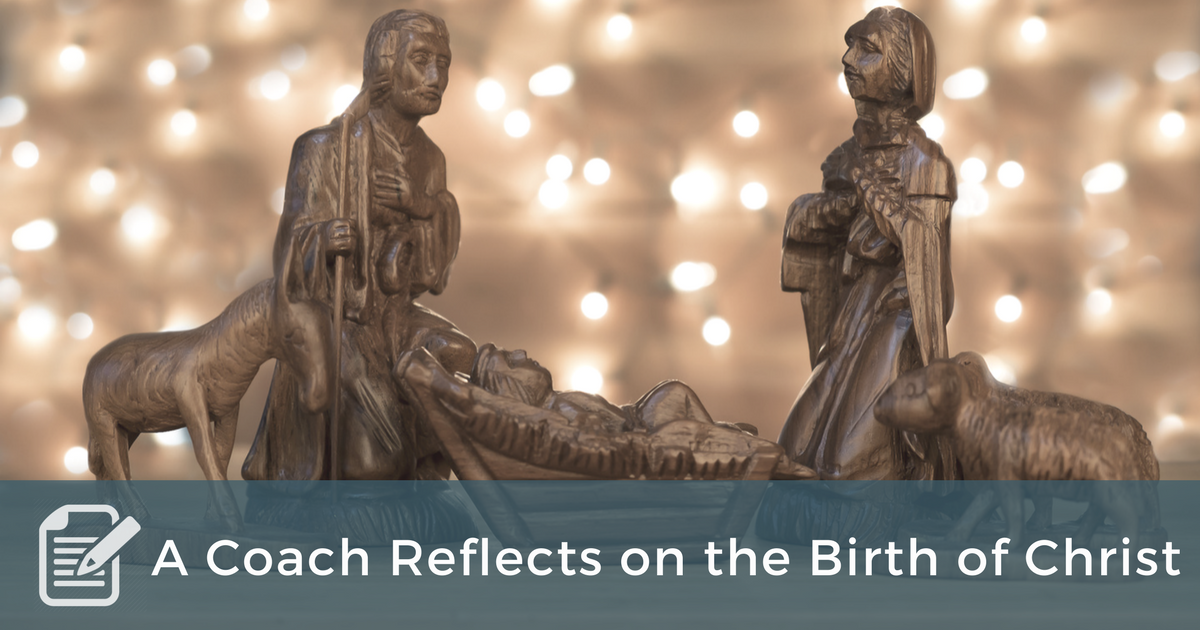
At Christmas, we reflect on the unique journey of God as He leaves heaven and takes up residence in a single cell of human flesh. It isn’t the birth of Christ that astounds me. It is the conception of Christ that leaves me without words. I believe that at the moment of conception, what scientists call a zygote (a single-cell fertilized egg), the Son of God bound Himself to human flesh.
When I think about this from a coaching perspective, I know that when we accept Jesus, He enters into us much as He did into Mary. He enters small. Yet in that smallness, He brings into us what it means to be both fully human and eventually to be a complete and whole spiritual being. I’m struggling with words to describe this but the gospel is clear – that we will become like Him. He’ll still be God, and we won’t, but let’s not undersell the path He has put before us.
This growth often occurs by reflection. We consider what we are and what we are to become, and we submit ourselves to a renewal from old self to new self. Coaching at its best asks, “Who are we in God’s unfolding story?”
My friend and partner Chad Hall said, “An unreflected life is one that goes after base desires.”
Every coach can become a better coach by reflecting on the conception of Christ.
- The conception of Christ is God’s clearest communication of partnership with us.
- The conception of Christ gives me hope that I don’t have to give in to my basest desires.
- The conception of Christ helps me more clearly see that I can become more than anyone ever expected.
Partnership
To understand Jesus’ descent into the world, we can understand his choices by considering that he came to partner with us. We can’t make the journey on our own. We must bind ourselves to Christ.
Partnerships start by each person becoming vulnerable and available. For instance, a coach takes up residence where the client lives and still leave plenty of space for the client. The Christ-like coach dives into their world without judgment or hesitation. It is the greatest act of love we can show – to simply live with them for a little while.
Jesus Himself doesn’t take responsibility for our lives. We don’t become saintly robots. Instead, through His partnership, He opens our eyes to reflect on what is best. Some people take great advantage of the partnership. Many do not. Jesus never condemned anyone, though their choices often made Him sad and sometimes angry.
We can become better partners in the coming year by upping our level of respect for our clients (and for each other) by becoming even more curious about their God-given strengths and God-given circumstances. What has God put in their path that only they could take advantage of this next year?
We do a grave disservice in trying to point out what we think they should do in every situation. We do them a great service by helping them begin to identity what God has for them so that they can learn to follow His lead with less and less reflection.
Goodness
Jesus personal circumstances were much worse than any I have ever faced. He faced homelessness, violence and shame before He could walk. We never hear of Jesus’ human father after the birth in that lonely stable. Jesus wore the same flesh that calls us all into corruptible desires. And yet, Jesus became the best known, best loved person in all of human history. He was uncorrupted.
A Christian coach is in the unique position to say everyone can overcome their past and become a blessing to their community. Jesus tells story after story like this. The writers of the Old Testament love this theme as well. Which stories come to your mind about the redemption of a person’s past?
Jesus produced evidence that human flesh can overcome our most sinful desires. We don’t have to act on every impulse. We can retrain our minds to lead us in better directions. Coaches help clients discover core values and convictions that build healthy strategies for living and working. Clients no longer just have to react. They get the opportunity to really think through their next step.
The Apostle Paul wrote a mantra for the Christian coach:
Whatever is true, whatever is noble, whatever is right, whatever is pure, whatever is lovely, whatever is admirable – if anything is excellent or praiseworthy – think about such things. – Philippians 4:8
If you are doing that, you will be one in a million and highly sought after.
Identity
As far as I know, Jesus still has human flesh. He was different after the resurrection, but He still ate and famously let Thomas touch wounds which remained in His hands and His side. The Old Testament spends a lot of time revealing the hidden identity of major characters. No one realized that Joseph would save his family, let alone nations. No one realized that Moses would return to free His people from slavery. No one realized that this shepherd boy would slay a giant and become the greatest king a nation has ever known. Is identity only for the greats?
Jesus said:
I will also give that person a white stone with a new name written on it, known only to the one who receives it. – Revelation 2:17
Jesus has a place for all who call on His name. When you are coaching a client, you are coaching an eternal person with an eternal calling upon their life. I believe that Moses is still leading, that Joseph is still providing, that David is still protecting, that Mary is still loving, and that Paul is still pressing the boundaries.
We can become better coaches by asking questions that help our clients discover who God has created them to be at this present time and into the future. We should ask questions we can’t possibly know the answers to. We should ask questions that make our clients think at the deepest possible levels of the human mind. We should ask questions that lead our client to taking strong action where God has revealed His will in their lives.
Take time this Christmas season to reflect on the implications of Jesus incarnation into the human race and eventually, into our own bodies through faith.


